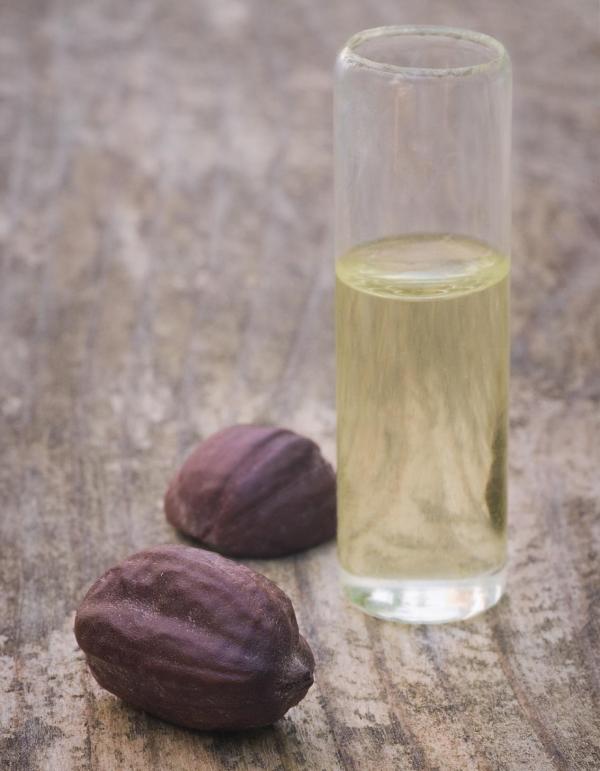
Forget diamonds, jojoba oil is the true liquid gold of the beauty world. This wondrous oil, extracted from the humble jojoba shrub, isn't actually an oil at all, but a liquid wax with a unique chemical makeup. This special composition makes it a lightweight, non-greasy marvel, readily absorbed by your skin and hair without clogging pores. Its benefits go beyond mere absorption though, jojoba oil is a powerhouse of nourishment, boasting anti-inflammatory, antibacterial, and antifungal properties.
This oneHOWTO guide will unveil the surprisingly simple process of making your own jojoba oil at home, saving you a significant amount compared to store-bought brands.
The first step on your DIY jojoba oil journey is acquiring the star ingredient: the jojoba seeds. While not readily available everywhere, you can check local garden centers or explore online retailers.
Once you've secured your precious cargo, remember to air-dry them for a week or two. Patience is key, as optimal wax extraction depends on the seeds reaching peak dryness, which can take up to two weeks.
Now, a curious fact: jojoba seeds boast a whopping 54% wax content, contributing to their rich oil and moisture. However, for efficient extraction, we need to bring that down to around 10%. This adjustment will be discussed in the following steps, ensuring you maximize the golden treasure trapped within each seed.

Once your jojoba seeds have dried for a week or two, they're ready for oil extraction. This process separates the oil from the remaining plant material, including waxes and husks. Here's how to transform your seeds into precious jojoba oil:
Use a dedicated seed press or improvise with manual methods like grinding and straining. Aim for gentle pressure to avoid damaging the oil quality.
The extracted mixture will initially contain both oil and wax. You can separate them through various methods:
- Pass the mixture through a cheesecloth or fine-mesh strainer to capture the wax while allowing the oil to pass through.
- Chill the mixture. The wax will solidify and become easier to remove.
For even purer oil, consider further refining by using a centrifuge or settling the oil for several days to allow any remaining sediment to settle at the bottom.
Jojoba oil contains high levels of protein and a unique compound called simmondsin. While once considered toxic, simmondsin is now known to be an appetite suppressant with potential health benefits. However, for cosmetic or culinary use, removing all traces of seeds and waxes is recommended to ensure clarity and purity of the oil.
Harness the power of marula oil for skin and hair rejuvenation. Discover its secrets in our other article.
Once you've extracted your precious jojoba oil, it's time to ensure its longevity. Here's how to store it safely:
- Choosing a container: opt for a dark-colored glass bottle or a tightly sealed, opaque plastic container. Light exposure can degrade the oil over time, so opting for darkness is key.
- Transferring the oil: carefully pour the extracted oil into your chosen container, leaving minimal headspace to reduce air exposure.
- Tightly seal it: secure the lid or cap firmly to prevent any potential leaks or contamination.
- Store in a cool, dry place: find a dark, cool cupboard or cabinet away from direct sunlight and heat sources. This provides optimal storage conditions for your jojoba oil.
- Enjoy its longevity: unlike many cosmetics with expiration dates, jojoba oil boasts remarkable shelf life. Stored properly, your homemade oil can last for years without spoiling or losing its potency.
Here are some additional tips for maximizing shelf life:
- Consider adding a few drops of vitamin E oil to your jojoba oil for an extra antioxidant boost.
- If you notice any unusual changes in color or scent, it's best to discard the oil for safety.
- Label your container with the extraction date to keep track of its age.
With proper storage, your homemade jojoba oil will be a reliable source of natural beauty and health benefits for years to come.

Jojoba oil is a beauty powerhouse, offering a treasure trove of uses for various skin and hair needs. Here are just a few ways to unlock its magic:
- Deep hydration: quench thirsty skin with a luxurious touch. Jojoba oil's lightweight feel and potent moisturizing properties leave skin feeling soft, supple, and radiant.
- Gentle makeup removal: ditch harsh chemicals and experience the wonders of nature. Jojoba oil effortlessly melts away even stubborn mascara and eye makeup, leaving your eyes feeling refreshed and irritation-free.
- Balancing oily skin: unlike many oils, jojoba oil mimics the skin's natural sebum, helping to regulate oil production and prevent clogged pores. Its anti-inflammatory properties further soothe acne-prone skin, leaving it calm and clear.
- Oil preservation: extend the shelf life of your cherished home oils with a touch of jojoba. Its inherent stability and antioxidant power help combat spoilage, ensuring your favorite oils stay fresh and potent for longer.
Remember, the beauty of jojoba oil lies in its simplicity. Experiment with different applications to discover what works best for you.
If you want to read similar articles to How To Make Jojoba Oil At Home, we recommend you visit our Beauty & Personal Care category.